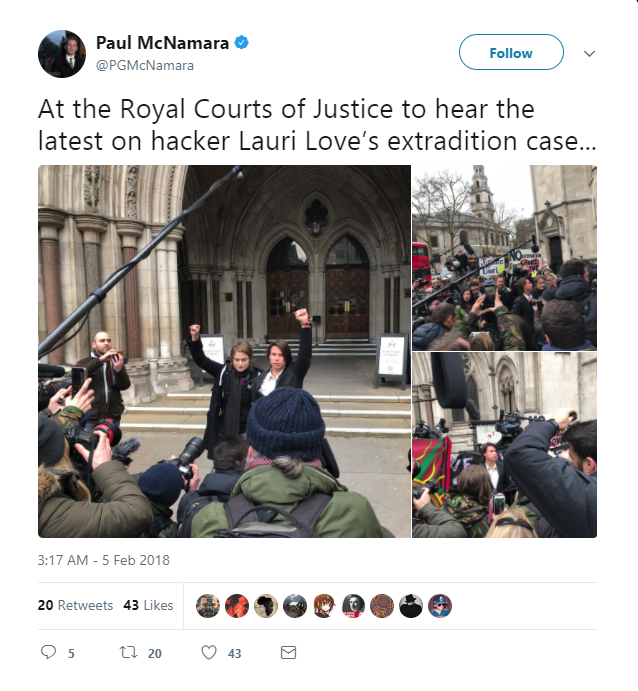WeAreChange
Alleged Hacker Lauri Love Wins Extradition Appeal |
| Alleged Hacker Lauri Love Wins Extradition Appeal
Posted: 05 Feb 2018 10:30 AM PST Lauri Love has won his legal battle against being extradited to the US over alleged cyber attacks. Mr Love is a 33-year-old British national who, through his mother, also has Finnish nationality. The High Court ruled that Love should be tried in Britain after Lord Chief Justice Lord Burnett and Mr Justice Ouseley heard he suffered from severe mental illness and would be in danger of committing suicide if extradited to the US.
One of the principal issues before the court was “whether his extradition would be unjust or oppressive by reason of his physical or mental condition” and “whether various rights guaranteed by the European Convention of Human Rights [“ECHR”] would be breached…” should he be extradited. The court handed down the verdict that “Mr Love’s extradition would be oppressive by reason The judgement didn’t dispute that Love “suffers from eczema which he has had since birth, and which is a partly stress-related physical condition exacerbated by his mental health issues (…).” The court also accepted that Love has Asperger Syndrome (AS) which the judgement described as “a very severe disability because it causes him to become so absorbed in his interests that he neglects important areas of his life, such as his studies, and even his health (…).”
Professor Kopelman produced a third report on Love’s mental fitness in relation to his incarceration in a United States facility and his standing trial there. Kopelman stated:
The judgment stated that keeping Love on suicide watch while in the US was not a satisfactory reason to allow the extradition:
What did Love have to say about the judgement?
Love went on to thank all of the UK MP’s who put aside partisan disagreements to have a consensus on fundamental values such as compassion, understanding and accommodation. He gave special thanks to MP Barry Sheerman, who has campaigned for Love in the House of Commons. Love also wished for people to be more understanding about AS and how it effects people. Love said:
What is Love accused of?On July 15th 2015, Mr Love was arrested pursuant to a warrant, issued following certification of the three extradition requests but has been on bail since then. Mr Love is accused in three indictments that between the period October 2012 to October 2013, he, working with others, made a series of cyber-attacks on the computer networks of private companies and United States Government agencies (including the US Federal Reserve, US Army, US Department It is further alleged Mr Love also carried out “SQL Injection Attacks” in which unauthorised access was gained to computer databases by manipulating “structured query language”, computer programming language designed to retrieve and manage data on computer databases (the “SQL Injection Attacks”). What now for Lauri Love?The judgement noted that “Mr Fitzgerald QC for Mr Love was at pains to emphasise that Mr Love did not seek impunity for the acts alleged against him, but contended that he should be tried and if Speaking outside the court, Mr Love said he hoped he had set a “precedent so this will not happen to people in the future”. “I’m hoping that this outcome can contribute to the discussion we are having as a society about how to accommodate people that have neuro-diversity, whose brains are made up in a slightly different way,” he said.
His father Alexander Love said: “This is a victory for justice. What makes Great Britain great is that we live in a place with wisdom and compassion.” The United States authorities now have 14 days to lodge a request for an appeal hearing at the UK Supreme Court. The post Alleged Hacker Lauri Love Wins Extradition Appeal appeared first on We Are Change. |















